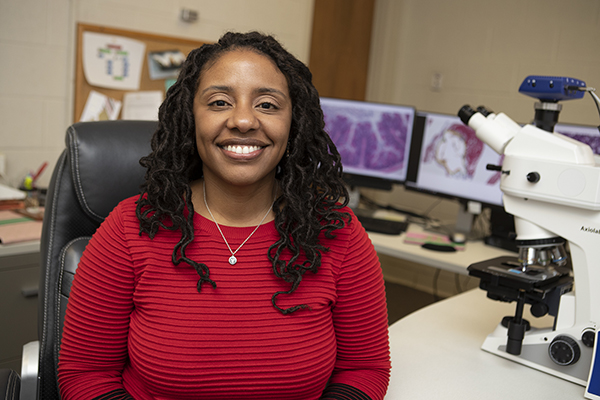CVM Researcher Recognized on National List of Inspiring Black Scientists
Story by Megan Myers, CVMBS Communications

Dr. Yava Jones-Hall, an associate professor in the Department of Veterinary Pathobiology (VTPB) at the Texas A&M College of Veterinary Medicine & Biomedical Sciences (CVM), is leading in the field of veterinary medicine as the only veterinarian selected for CrossTalk’s list of 100 inspiring black scientists in America.
CrossTalk is the official blog of Cell Press, a leading publisher of more than 50 scientific journals across the life, physical, earth, and health sciences.
“We are very happy to see one of our high-caliber faculty members being recognized for their outstanding work,” said Dr. Carol A. Fierke, Texas A&M University provost and executive vice president.
Jones-Hall is joined on the list by scientists from African, Afro-Caribbean, Afro-Latinx, and African-American backgrounds ranging from assistant professors to department heads at universities across the country.
“It was surprising and amazing to be selected, especially being a veterinarian,” Jones-Hall said. “It was nice to see veterinary medicine represented.”
The list of inspiring black scientists was created to encourage current and future generations of scientists and emphasize the importance of diversity in science. CrossTalk clarified that while there are many more than 100 black scientists in the U.S. deserving of recognition, the list was created to provide an example of the impact black scientists can have on America.
“Diversity drives excellence in everything that we do as a team, including biomedical education and research,” said Dr. Ramesh Vemulapalli, VTPB department head. “We are very proud to have Dr. Yava Jones-Hall on our faculty. She is a great role model to minority students aspiring to pursue a career in veterinary medicine.”
“I definitely see diversity in veterinary medicine as an important concept,” Jones-Hall said. “The reality is, the world is not homogeneous. We need our students to be exposed to working with different types of people to have cultural sensitivity and understand that not everybody is like you. Also, once you have diversity within any program, you get diverse ideas.”
While earning her Doctor of Veterinary Medicine (DVM) degree at the Tuskegee University College of Veterinary Medicine, Jones-Hall was introduced to the field of pathology—the study of the causes and effects of disease—and once she saw how seamlessly pathology combines with collaborative research, she was hooked.
“As a veterinary pathologist, I’m trained to understand disease in any organ in a multitude of species,” Jones-Hall said. “Whatever field of research an investigator’s in, I help them figure out how best a pathologist can tease out the data for them to see what’s happening and how best to frame the research.”
Considering herself a “veterinary detective,” Jones-Hall helps researchers look at clues in cells and body tissues to find the best way for the research to progress. Working on a variety of research topics, and never knowing what will come through the door next, are what make the field of pathology so appealing to her.
Jones-Hall joined the CVM from the Purdue University College of Veterinary Medicine last August and, as the Director of the CVM’s Histology Laboratory, began the project of creating a digital pathology program to increase the efficiency and accuracy of one of a pathologist’s typical jobs—analyzing slides of cells to count those of the same kind.
“Traditionally, pathologists would look at the slide under the microscope and give a subjective assessment of disease,” Jones-Hall said. “Digital pathology augments traditional pathology by allowing the pathologist to use computer-generated algorithms to assess disease. This gives objective, quantifiable, and repeatable results.
“Whereas it would take me weeks to look at hundreds of slides, I scan the slides to make a digital image and direct a computer program to find the cells of interest or disease state,” she said. “Hundreds of slides can now be analyzed in hours instead of weeks.”
Outside of the lab, Jones-Hall donates much of her spare time to volunteering for community outreach efforts and taking any opportunity she can to promote STEM careers, and specifically veterinary medicine, to disadvantaged youth.
She is also a member of Texas A&M’s STRIDE (Strategies and Tactics for Recruiting to Improve Diversity and Excellence) Committee, leading workshops for faculty members involved in faculty recruitment.
“Diversity is important, in general, and it’s important to me, so I’m willing to do more in order to improve the climate and increase everyone’s awareness” she said.
Jones-Hall hopes that her recognition from CrossTalk can inspire others to spend their careers thinking not only of themselves, but also those who may not have had the same advantages.
“The CVM is extremely proud of Dr. Yava Jones-Hall for her accomplishments as an individual and as the only veterinarian to appear on the list of 100 inspiring black scientists,” said Dr. Eleanor M. Green, the Carl B. King Dean of Veterinary Medicine at Texas A&M University (TAMU). “The work she does within and outside of the university will undoubtedly make a huge impact, both for the college and within the community, as she demonstrates the possibilities for budding scientists from all backgrounds.”
###
For more information about the Texas A&M College of Veterinary Medicine & Biomedical Sciences, please visit our website at vetmed.tamu.edu or join us on Facebook, Instagram, and Twitter.
Contact Information: Jennifer Gauntt, Director of Communications, Texas A&M College of Veterinary Medicine & Biomedical Sciences; jgauntt@cvm.tamu.edu; 979-862-4216


